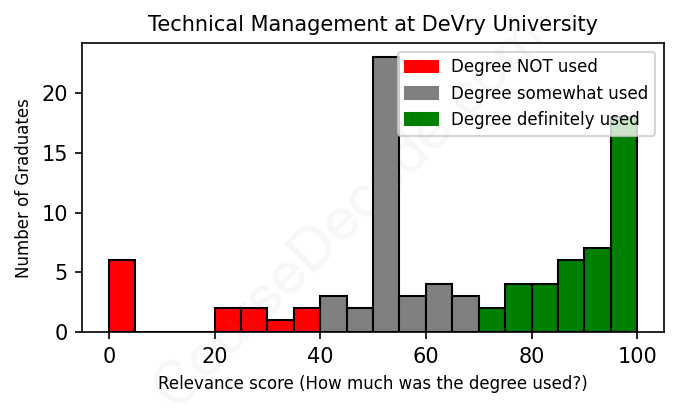
First, some facts. Of the Technical Management graduates from DeVry University we've analyzed , here's how many have used (or NOT used) their degree in their career:

These are estimates based on AI analysis of 92 LinkedIn profiles (see below).
The verdict? Slightly below average. Overall, with an average relevance score of 64%, Technical Management graduates from DeVry University have a slightly lower likelihood (-3%) of finding work in this field compared to the average graduate across all fields:
And for comparison, here's the chart for all profiles we've looked at across all degrees.
Also, after graduating, 36% of these graduates have pursued further education other than another Bachelor's degree (such as a Masters degree or other), compared to the average across all profiles of 35%. This suggests you may need more than just a Bachelors degree to be competitive as a Technical Management graduate.
See the details:
|
Relevance score: 40% We think this person has NOT gone into a career related to their degree. We think this person has NOT gone into a career related to their degree.
DEGREE INFOGraduated in 2012 from DeVry University with a Bachelors Degree in Technical Management. Also pursued further education since (see below). JOB HISTORY SINCE GRADUATIONSupervision Officer II Georgia Department of Community Supervision May 2015 - Present Field Training Officer  Georgia Department of Community Supervision Jul 2017 - Present Assistant Chief  Department of Communuity Supervision Jun 2019 - Present FURTHER DEGREES DONE SINCE GRADUATINGMasters DegreeKeller Graduate School of Management of DeVry University 2012 - 2014 ABOUTExperienced Supervisor with a demonstrated history of working in the law enforcement industry. Skilled in Microsoft Word, Government, Law Enforcement, Emergency Management, and Public Speaking. Strong professional with a Masters Degree focused in Public Administration from Keller Graduate School of Management of DeVry University. |
The top 10 most common jobs done by the graduates we've analyzed (ranked most common to least) are:
After analyzing a plethora of job profiles from LinkedIn, it’s clear that graduates of the Technical Management program at DeVry University ventured into a variety of roles. Some of the most common employment paths include positions like program managers, project managers, technical specialists, and various managerial roles in diverse industries. It’s interesting to note that while many of these jobs might involve elements of management or technical skills, not all of them align closely with the core technical management qualifications acquired during their education.
In terms of relevance, the degree in Technical Management gives graduates the toolkit to handle complex operations and manage teams effectively. Several profiles show individuals successfully stepping into roles that require explicit application of technical skills, such as Information Technology Supervisor or Production Manager. These positions directly use the principles learned in their degree, making them a great fit. Conversely, there are numerous examples of graduates who’ve found themselves in areas like sales or customer service, where the connection to their degree feels quite tenuous. Positions such as a Store Manager or a Security Officer may employ some general management skills, but they don’t usually tap into the specific technical management training that the degree intends to provide.
Furthermore, quite a few graduates have thrived in technical fields like IT and engineering, further showcasing the practical application of their education. Roles such as Software QA Analyst and Systems Analyst demonstrate how the degree empowers individuals to succeed in tech-centric career paths. However, there’s also a notable number of professionals who have taken on entrepreneurial ventures or less conventional roles where the relevance of their degree is less pronounced. For instance, owning a landscaping business doesn’t really channel the technical management focus of their studies.
In summary, while many DeVry graduates have indeed secured roles closely related to their Technical Management studies, a significant number have branched off into areas where their degree may only play a supportive role. It presents an interesting picture of a diverse job market where technical management skills can be both highly relevant and sometimes strangely disconnected from their intended application. Just remember, a degree can open doors, but it’s up to the individual to craft their own path in this wide-ranging employment landscape!
Here is a visual representation of the most common words in job titles for Technical Management graduates (this is across all Technical Management graduates we've analyzed, not just those who went to DeVry University):

So, let’s break down what graduates from DeVry University who earned a degree in Technical Management have been up to after graduation. It seems like a pretty mixed bag when it comes to their career trajectories. From what I can gather, many of them landed roles that align with their technical management studies, especially in the early years after graduation. For instance, there are quite a few who began their careers in positions like programming, project management, and even some in technical roles within various industries. This suggests that the foundation of their degree is indeed helping them find relevant work, at least initially.
If we look at the first jobs after graduating, it’s common to see titles like 'Program Manager,' 'System Engineer,' and various administrative roles. This indicates that many graduates likely took positions that allowed them to leverage the skills learned during their studies. However, as time goes on, there seems to be a bit of variation. Some have moved up into leadership positions, like directors or managers, especially in technical fields such as IT and engineering, which showcases a positive career trajectory. But there are also cases where individuals have strayed into unrelated job paths, such as hospitality or roles in security, which seems a bit off-track from technical management.
Fast forward to five or even ten years later, and the career paths begin to display a broader range of outcomes. While there are many success stories, like those who have moved up to senior management roles, there are also quite a few graduates who’ve ended up in unrelated fields or even doing jobs that barely align with their degree. For instance, some have ventured into real estate, education, or even retail management — positions that don’t really tap into the technical management competencies they developed during their studies. This points to a potential challenge that graduates face: translating their degree into a fulfilling and relevant career path in an ever-evolving job market.
In summary, while many DeVry graduates in Technical Management seem to have started strong with relevant positions, their long-term careers reflect mixed success. Sure, there are solid careers in tech and management emerging from this program, but there’s also a group who didn’t quite find their way into the fields this degree intended to prepare them for. If you’re looking at this program or something similar, it’s important to keep in mind that the journey can take many paths — not all of which may lead where you'd expect!
Honestly, a Bachelor’s degree in Technical Management, whether at DeVry University or somewhere else, tends to be more on the manageable side compared to some other technical degrees. It usually combines some business courses with tech-related topics, so if you have a decent grasp on technology and are willing to put in the effort to understand the management side, you should be able to keep up. That said, like any degree, it has its challenging moments, especially if you hit a tough project or a class that requires a lot of reading. If you stay organized and participate actively in your classes, you’ll likely find it more doable than you might expect!
Most commonly, in the LinkedIn profiles we've looked at, it takes people 2 years to finish a Bachelor degree in Technical Management.
Looking at the careers of these DeVry University grads, it seems like there's a solid mix when it comes to their earnings. Some of them have landed pretty high-paying positions like “Director of Corrosion Control” or “Network Implementation Program Manager,” which typically come with respectable salaries. A few others are entrepreneurs or in long-term roles that might not have as flashy a title, but they seem to have maintained steady employment. These paths can be profitable, especially if they build a solid client base or customer loyalty.
On the flip side, there are also profiles that show a bit of instability, like those with various shorter-term roles or who have taken time off from their careers. For some, that might mean lower earnings or a slower start in their careers. Overall, though, it looks like many of these grads are finding ways to make decent money and build their careers, especially those in tech and management. So, if you're considering a path like this, it sounds promising, but staying focused and adaptable might be key to hitting those income goals!
Here is a visual representation of the most common words seen in the "about" section of LinkedIn profiles who have a Bachelor degree in Technical Management (this is across all Technical Management graduates we've analyzed, not just those who went to DeVry University). This may or may not be useful:

Here are all colleges offering a Bachelor degree in Technical Management (ordered by the average relevance score of their Technical Management graduates, best to worst) where we have analyzed at least 10 of their graduates:
| College | Score | Count |
|---|---|---|
 Embry-Riddle Aeronautical University Embry-Riddle Aeronautical University
|
69 | 29 |
 DeVry University DeVry University
|
64 | 92 |